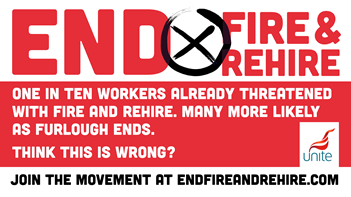Living Wage boost
As the Living Wage is raised today (November 3) by 20p outside of London (from ÂŁ7.65 an hour to ÂŁ7.85 an hour), and by 35p in the capital (from ÂŁ8.80 to ÂŁ9.15), over 600 more employers this year have committed to paying their employees at least this amount.
National Living Wage Week, which commenced today and runs through Saturday, has seen a significant rise in the number of accredited Living Wage employers, now totalling more than 1,000, up from about 400 last year.
Companies now on board include 18 FTSE 100 companies (up from only four), 20 local authorities, Nestle, Google (the first Living Wage tech company) and Ogilvy & Mather (the first Living Wage global communications company).
The Living Wage, on which UNITElive has extensively reported, is a non-statutory hourly wage rate that is considered the minimum necessary to live a decent, basic life. It is significantly above the legally binding National Minimum Wage and more accurately reflects the soaring cost of living.
Modest gains
Although the modest rise and increasing employer interest in the Living Wage has been announced with much fanfare, research suggests that the change will only benefit 60,000 workers—while over five million in the country continue subsisting on poverty pay.
These numbers translate into an average of one in every five workers being paid less than the Living Wage, a number that rises to a startling 1 in 4 in regions such as Yorkshire and Humber, according to a report released today by KPMG.
And despite today’s good news, the number of people living below the Living Wage is growing, not receding. According to KPMG, 147,000 joined the 5.2m-strong army of underpaid workers this year alone.
The report also found that low pay is rife in industries and sectors dominated by young, part-time and female workers, such as hospitality and retail.
The profile of a typical UK worker earning less than the Living Wage is a 26-year-old woman working in outer London as a sales assistant, the report noted.
Employer goodwill not the answer
Unite regional officer Dave Turnbull welcomed the significant increase in employers signing up to the Living Wage, but expressed reservation.
He argued that the Living Wage campaign risks being co-opted by employers as nothing more than a promotional tool, with workers being hurt in the process.
“In many of these examples it is actually the sub-contractors, who supply catering, cleaning and security staff to these companies, which are instructed as part of their contract negotiations to pay the Living Wage,” he explained.
“Where there is no direct union involvement this often leads to contractors seeking to make the Living Wage commitment of their client self-financing through reductions in head count, cuts in hours of work, or changes to benefits such sick pay,” Turnbull added.
“In this way it can be the case that some workers are actually no better off in real terms, but the client company gets all the kudos of being a Living Wage employer.”
Turnbull emphasised that the introduction of the Living Wage in any given workplace must be supplemented by strong union involvement.
“Where the union is involved we can make sure the Living Wage is implemented in a fair way which ensures other terms and conditions are not undermined,” he said. “What we need moving ahead is to strengthen collective bargaining rights so that they are not solely reliant on the benevolence of a few enlightened employers.”
Turnbull pointed to the industries rolling in profits which continue to be cesspools of poverty pay.
“One only has to look at the lack of real progress on the Living Wage in brand-name hotel, restaurant and supermarket chains to see why a process reliant on employer goodwill is simply not addressing the growing number of workers who continue to be paid less than a Living wage,” he said.
Unite assistant general secretary Steve Turner agreed, saying of the latest Living Wage hike, “While it is a welcome sign that the Living Wage is gaining traction among more and more employers, our job in dismantling low-pay Britain is far from over.”
“With over 5 million women and men still earning well below even the previous Living Wage and the tax payer continuing to subsidise low pay for profitable employers through tax credits and housing benefits, we should keep in mind that not all employers are committed to a fair day’s pay for a fair day’s work” he added.
“This is why we as a union are calling for an immediate ÂŁ1.50 hike to the national minimum wage, which our research has shown is entirely affordable, and the return of sector level collective bargaining,” Turner explained.
“We cannot depend on the largesse of a handful of employers to deliver us from the evil that is deliberately depressed, poverty-pay for millions while those at the top pocket millions in salaries, bonuses and share options.”
Be sure to check in daily on UNITElive.org as we bring you the latest on Living Wage week.
 Like
Like Follow
Follow


